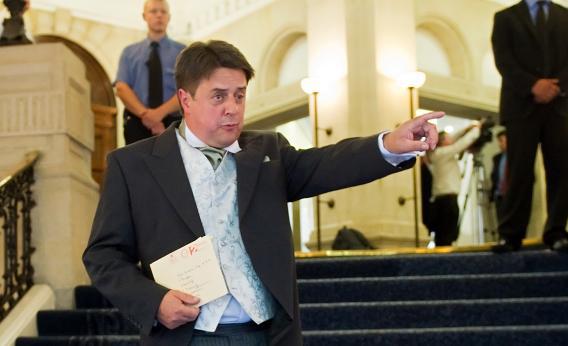A Bulgarian taekwondo champion, two Portuguese Communists, and a British earl were among the odd group of European politicians who yesterday voted against a move to restrict the export of spy gear and censorship tools to autocratic regimes.
A resolution in the European Parliament calling for stricter oversight of companies selling equipment to countries such as Syria or China was passed overwhelmingly on Wednesday, with 580 votes for, 28 against, and 74 abstentions. The idea is to keep European companies from being complicit in human rights violations.
Now that it has been passed by a majority of members—who vote as individuals representing a political party, not a country—the resolution will be considered by the European Commission, the EU’s executive body, which has been asked to put forward a proposal for legislation by 2013. (Full details about the EU Parliament’s labyrinthine legislative process can be found here.)
So who would vote against to a proposal that seems so unobjectionable? The list showing which way the MEPs voted reveals that eight British politicians went against the resolution, along with five from Poland; three from the Czech Republic; two from Portugal, the Netherlands, Malta, and Germany; and one each from France, Italy, Austria, and Bulgaria.
Several well-known right-wing politicians feature, such as British National Party Chairman Nick Griffin and Philippe de Villiers, a former French presidential candidate known for his outspoken criticism of Islam and staunch anti-immigration views.
Bulgarian national taekwondo champion Slavi Binev, who has described himself as the “the only dissident in Bulgaria,” also voted against, as did: Portuguese Communists Joao Ferreira and Ines Cristina Zuber, the only overtly leftist members on the list; Dutch MEP Daniel van der Stoep, who previously resigned from the European Parliament after crashing his car while drunk; English Conservative Daniel Hannan, an author who writes for the right-leaning Daily Telegraph; and William (the Earl of) Dartmouth, a member representing the U.K. Independence Party, an anti-immigration populist party defined by its strong desire to remove the U.K. from the European Union.
Asked why he and five* of his UKIP colleagues had voted against a resolution calling for greater accountability and scrutiny of companies selling censorship and surveillance tools to dictators, the Earl told me: “UKIP opposes torture and helping autocratic regimes. However, we object to the EU speaking in our name on this topic.”
Aside from “inviting” parliament to introduce new measures by 2013 restricting sales of “mass surveillance” and Internet blocking equipment, the resolution also calls for full and open investigations into EU member states’ involvement in human rights abuses that relate to complicity in the U.S. government’s extraordinary rendition program; universal ratification of the Convention on the Rights of the Child; and more consistent cooperation with the International Criminal Court. Each of these clauses, in addition to the provisions for restricting surveillance tech sales, may also have been a factor in the decision to vote against.
All 28 of the politicians who opposed the resolution can be found below. They are listed by parliamentary political group.
European Conservatives and Reformists:
Daniel Hannan (England, Conservative); Edvard Kožušnik (Czech Republic, Civic Democratic Party), Mirosław Piotrowski (Poland, Law and Justice), Oldrich Vlasak (Czech Republic, Civic Democratic Party), Jan Zahradil (Czech Republic, Civic Democratic Party).
Europe of Freedom and Democracy:
William (The Earl of) Dartmouth (England, UKIP), Magdi Allam (Italy, Io amo l`Italia), Marta Andreasen (England, UKIP), Gerard Batten (England, UKIP), Bas Belder (Netherlands, Reformed Political Party), John Bufton (Wales, UKIP), Tadeusz Cymański (Poland, Law and Justice), Nigel Farage (England, UKIP), Roger Helmer (England, UKIP), Jacek Kurski (Poland, Law and Justice), Jacek Włosowicz (Poland, Solidarna Polska), Zbigniew Ziobro (Poland, Solidarna Polska), Philippe de Villiers (France, Mouvement pour la France).
European United Left/Nordic Green Left:
Joao Ferreira (Portugal, Partido Comunista), Ines Cristina Zuber (Portugal, Partido Comunista).
Non-Inscrits (non-attached members who don’t belong to any of the political groups):
Slavi Binev (Bulgaria, Independent), Nick Griffin (England, BNP), Ewald Stadler (Austria, Ewald Stadler), Daniël van der STOEP (Netherlands, Independent).
European People’s Party:
Simon Busuttil (Malta, Nationalist Party), David Casa (Malta, Nationalist Party), Martin Kastler (Germany, Christian Social Union), Joachim Zeller (Germany, Christian Democratic Union).
Correction, April 19, 2012: This sentence originally suggested that four members of the United Kingdom Independence Party voted against the measure. Six did.
